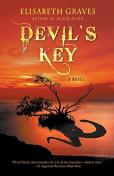BKMT READING GUIDES
Devil's Key
by Elisabeth Graves
Paperback : 0 pages
1 club reading this now
0 members have read this book
"[this] Florida native breathes life into all her characters -- dead or alive." --St. Augustine Record
Lucy Fowler plans to spend winter break on an island off the coast of Florida, to finish writing her thesis. She needs one last interview with an elderly midwife. Lucy almost cancels the ...
Introduction
"[this] Florida native breathes life into all her characters -- dead or alive." --St. Augustine Record
Lucy Fowler plans to spend winter break on an island off the coast of Florida, to finish writing her thesis. She needs one last interview with an elderly midwife. Lucy almost cancels the trip after she's brutally assaulted on campus. But in the end she goes, hoping work will be therapeutic.
On remote, isolated Ibo Key, Lucy learns midwife Esther Day is now confined to a psychiatric ward. She also learns that there was once a thriving black community, Revelation, on the island. Its residents all vanished one night long ago. Lucy decides to write about the ghost town, but no one will talk about what happened. Eventually, she uncovers the terrible story behind the town's destruction. Esther's rival, Soulange, once owned a mysterious book . . . a centuries old grimoire revealing the arcana of Obeah. An odd little man tells Lucy the island is cursed. That every man, woman, and child on it will soon die. And she begins to see glimpses of the past.
But by then she's stranded, trapped by a killer hurricane. To escape she must face her own connection to both the victims and perpetrators of a long-ago massacre . . . a crime so monstrous it invites the arrival of an evil old as time.
Devil's Key was originally published by Egmont Boker, Oslo, in 1999 as Svart Frikt. This Northampton House Press trade paperback edition is the first in the English language.
Discussion Questions
1. Do you think the past is truly past? Can mistakes and tragedies live on and return to "haunt" us, even when we try to make amends or forget? Why or why not, do you think?2. Lucy suffers a traumatic assault at the hands of someone she knows; a fellow student. After that she quickly decides that group therapy is not for her ("If it happened once, it could happen again. How could some 'crisis center' prevent that?") and that she simply needs to work harder, put the past behind her, and not trust anyone ever again. Do you think this viewpoint has any merit, or do you think professional help is always the best way to handle psychological trauma?
3. In the beginning of the novel Lucy Fowler feels she must have control over her life and all her choices. Do you think anyone can truly chose our own path in life -- or do the actions and choices of our ancestors, good or bad, still sometimes help determine who we are, or how we behave?
4. Lucy's mindset is gradually but dramatically changed when she encounters a number of events she can't explain -- the frequent, lemming-like suicides of the oddly-marked black songbirds; the strange walk she takes that leads her into a world that appears to be the 1950s; the eerie man in gray who seems to be following her, yet always disappears; the horrific replay of the attack on Revelation, with her as a ghostly, unseen witness. Do you think supernatural occurrences similar to the ones portrayed here might ever happen in real life? Why?
5. After her bad experience on campus, Lucy's dog Hercules becomes her most trusted -- and nearly her only -- friend in the world. Do you think there are times in life when an animal can be a better companion than another person? Why?
6. Lucy makes a number of judgments about the Key at first. She finds the white residents rather quaint and sometimes racist, and later decides her hospitalized interview subject, Esther Day, is an "old fool." Cora, the cafe owner, is "prickly." The few black residents she sees are "rude" because they seem to just ignore her. Nick Yulee she quickly dismisses as "a Good Old Boy . . a backwater racist." Is she justified in her opinions at the time? Do you think this sort of surface judgement is also common in real life? Why or why not?
7. As Lucy pursues the secret, fabled "Book" of Soulange Koumari, she finds herself doing things she could not have even imagined, before she came to Ibo Key. Spying, reading private diaries, stealing information, rooting around in an attic through an old chest containing mummified human remains . . . why do you think she can justify these things to herself now? Is she right or wrong to think this way?
8. When Lucy stumbles toward the docks and the Coast Guard boats evacuating the island, after Nick's death, she seems to feel more a part of the world again. For one thing, she thinks the other survivors are the "only ones who would ever believe her story." Though she doesn't plan to tell it until "much later, when she knew how it was actually going to end." Now that you know the character of Lucy better, and what she has learned (or perhaps not learned) in this experience, how do you think her story will finally end?
Book Club Recommendations
Recommended to book clubs by 0 of 0 members.
Book Club HQ to over 90,000+ book clubs and ready to welcome yours.
Get free weekly updates on top club picks, book giveaways, author events and more








